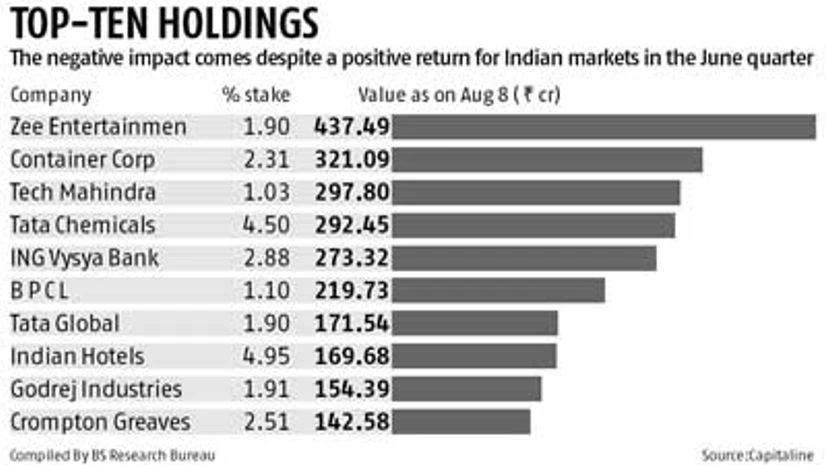Indian stocks have been a bad bet for the world's largest sovereign wealth fund, slowing down the behemoth's equity returns. The returns from the Indian stock market were among the worst for Norway’s Government Pension Fund Global, which manages in excess of $700 billion.
“Sorted by country, US and German stocks contributed most to the excess return, while investments in Japan and India made the largest negative contributions,” said its latest quarterly report.
A detailed break-up of its India holdings was not available. However, an examination of companies in which it has at least one per cent stake threw up 49 names with a total value of Rs 4,002.7 crore. Interestingly, a more comprehensive list of holdings released at the end of 2012 showed investments in 122 Indian companies.
For the latest quarter, its largest holding by value is Zee Entertainment, with a 1.9 per cent stake worth Rs 437.5 crore. It also has investments worth between Rs 250 and Rs 350 crore in Container Corp of India, Tech Mahindra, Tata Chemicals and ING Vysya Bank.
The negative impact comes despite a positive return for Indian markets in the June quarter.
The BSE’s Sensex index, whose returns are held to be representative of the overall market movement, rose 2.81 per cent during the quarter to 19,395.81 at the end of June.
The culprit may have been the rupee, which dropped 9.41 per cent against the dollar to Rs.59.39 during the June quarter. A depreciating currency reduces returns of foreign investors.
The report mentioned that the fund’s returns are measured in a weighted combination of the currencies in the fund’s benchmark indices for equities and bonds. The fund’s currency basket consisted of 35 currencies at the end of the second quarter, said the report.

The rupee has also fallen 5.26 per cent against the Norwegian krone during the quarter. A krone was worth Rs 9.3 at the beginning of the quarter. It dropped to Rs 9.8 at the end of June. It touched a low of 10.37 on August 7, according to Bloomberg data.
The fund invested 63.4 per cent in equities, 35.7 per cent in fixed income and 0.9 percent in real estate according to its quarterly report.
Its stock investments in the United States gave four per cent returns as per its currency basked, aided by better economic prospects. The stocks accounted for 31.1 per cent of the fund’s equity investments at the end of the quarter compared to a 10 per cent weightage for emerging markets.
The fund’s overall equity investments gave returns of 0.9 per cent for the quarter, compared to fixed income returns of -1.4 per cent. The fund as a whole returned 0.1 per cent in the second quarter. Real estate gave the best returns amongst the three asset classes, with investments yielding 3.9 per cent.

)
